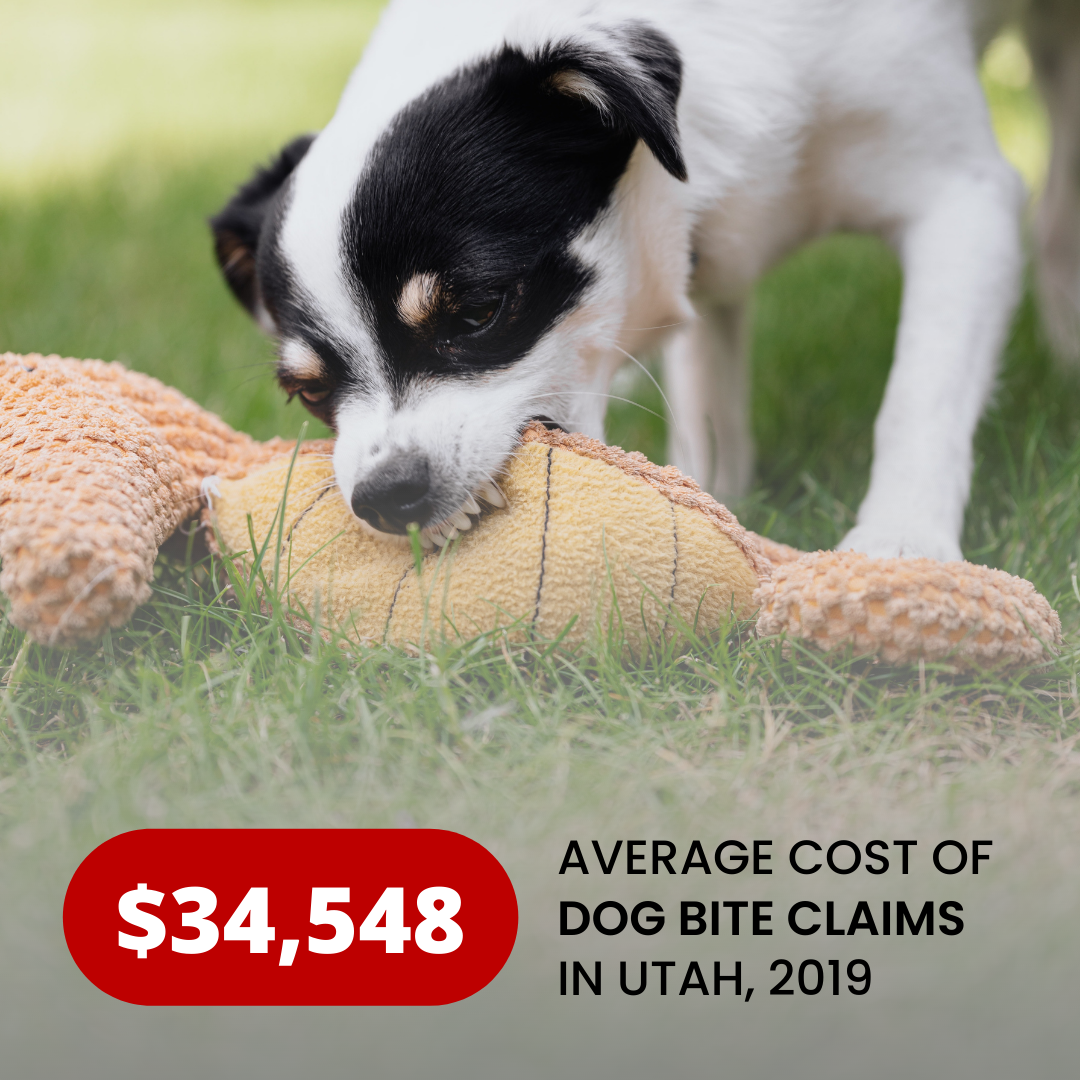Avoid painful and expensive dog bite claims
All dogs are inherently good dogs, I hope we can agree on that. Just like us, they are a product of their environment and everything they learn. No matter their breed or size, any dog can be sweet and harmless if they are given proper care and training. But the reverse is also true if they aren’t given proper care or training. That’s why getting a dog is no small undertaking.
As dog owners, we are the ones responsible for how our dogs behave and your home insurance company hopes you will take that responsibility seriously. If your dog causes any damage or injury, you are on the hook as the owner of the dog. Dog bite claims have consistently become more common and can cost a financially devastating amount. Dog bite claims cost an average of $34,548 in Utah in 2019 and only increased since then.
No one expects their sweet family pet to hurt others, but it can happen for any number of reasons and it's an owners job to prevent that no matter the size or friendliness of the breed. Here are some ways you can do that!
Research dog breeds before adopting and prepare accordingly.
Larger dogs require more space, quality time, and training to balance their size and energy. And some insurance companies won’t accept families that own larger dog breeds with greater jaw strength like mull mastiffs, doberman pinschers, rottweilers, pit bulls, or german shepherds, so you may have increased insurance premiums.Get them spayed or neutered as they will be less aggressive.
Research shows dogs that are spayed or neutered are less aggressive or unpredictable. Vets recommend you spay or neuter your pet after their first shots.Enroll your dog in training early.
Old dogs can learn new tricks, but it’s certainly easier when they are younger. Simple obedience training at home can start as early as 2 months old and formal dog training is recommended after they are 6 months old.Socialize your dog with humans and other dogs.
Socializing teaches your dog how to react to others in a healthy way. They learn not to fear other humans or pets. Being sure to closely supervise for the first few times, take your dog to dog parks or have doggy “play dates” with your friends dogs. Let your dog interact with other humans in your home, out on walks, or even at other homes. If you can, take the time to help them get to know children of different ages in a safe space.Secure your dog with a leash when out in public.
Even if your dog is trained and well-behaved, it’s important to secure your dog when out in public. Just like humans, dogs can have surprising reactions under new or scary circumstances. You also don’t know how other humans or pets around you may feel about dogs and they may feel safer knowing you have a hold of them.Don't leave your dog unattended with children under age 10.
To dogs, children are less predictable and may not have developed the common sense behaviors we adults know to have around dogs. Their grandma’s shih tzu may like being held like a baby or will patiently let the grandkids poke and play with him. But another dog may interpret that child’s touching and playing as scary or painful and react defensively. No matter how trustworthy you think either the children or dog are, it’s best to be safe.Provide appropriate outlets for their energy like toys, walks, and playtime.
Dogs that are under-stimulated may be unpredictable or too rough when they finally see their chance to use their pent up energy. In their excitement they could jump on the young girl scout that comes to your door or playfully (but painfully) bite your friend that wanted to play. They could also get bored and try to escape the yard or find strangers to entertain them. Channel their energy in healthy ways and teach them how to behave when playing or out walking.Know your dogs triggers and plan accordingly.
Dogs can have their own mental health struggles and even PTSD from their past. No matter how well-behaved, scared dogs are unpredictable and sometimes dangerous. As you get to know your dog, pay attention to the things that scare them. Training and appropriate play can help with things like anxiety, but you should always be gentle and not force them to confront their fears. Rather, help them to feel calm and safe when they are triggered and plan ahead in case that fear takes control. Make sure they can’t escape your home or yard and have a plan in place for when they feel triggered. Research extra help like Thundershirts, distracting toys, supplements, or talk to their vet about possible medications.Secure their home base with complete fencing tall enough they can't jump over.
Don’t give your dog opportunities to harm others by letting them get out of the yard and wander the neighborhood. Don’t expect your neighbors, young and old, to know how to act appropriately around your dog when it is wandering outside alone. Make sure your fencing is sufficient and watch for holes under the fence. If your dog is a talented escape artist, you need to invest the time and money to secure your property.
Even if you don’t own dogs yourself, if you have children you should take the time to teach them the basics of dog safety. They should know not to pet unfamiliar dogs without the owners expressed permission. approach barking, growling, or scared dogs. Teach them about appropriate play and how a dog might feel about their behavior. Just like some humans don’t like being hugged or poked or having their hair played with, dog’s have different preferences too and since they can’t talk, they have to find other ways to show when they don’t like something.
Most home/renter’s insurance companies cover dog bites, but may have exclusions based on bite history or breeds. This isn’t because insurer’s hate certain kinds of dogs, they just have a lot of data telling them that certain breeds are capable of a lot more (and a lot more expensive) damage. Say your Chihuahua got frightened and bit a child’s hand with full force. The child goes to the doctor and they find only stiches are necessary. You can afford to pay out of pocket for those bills and it cost less than your $1000 home deductible so no claim was necessary. How different might the situation be if it were a German Shepherd that bit the child with full force?
When you started your home or renter’s policy, your agent would have asked if you had a dog and what breed(s) to make sure you are properly covered. If a dog has joined the family since then or you aren’t sure how your insurance company would handle a dog bite claim, give your agent a call.
Dog bite incidents can be so scary, emotional, and expensive. Stay safe and smart and don't let it happen to you!


